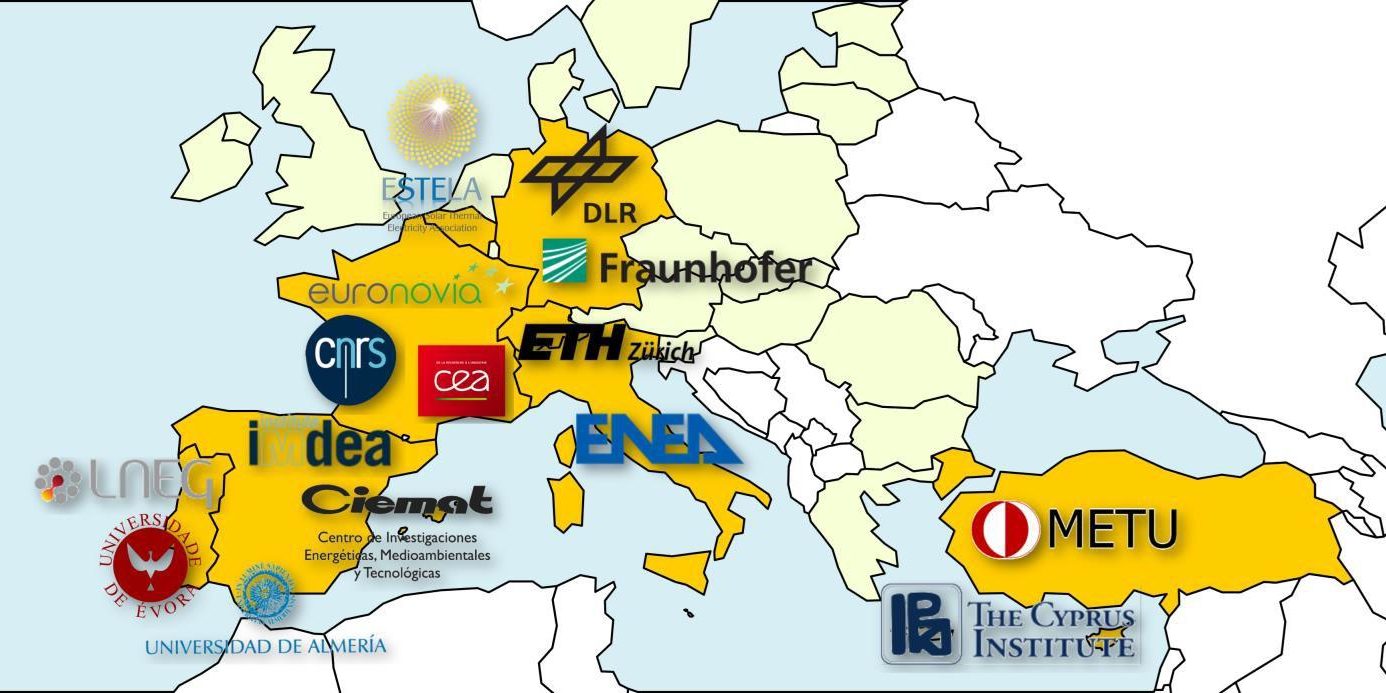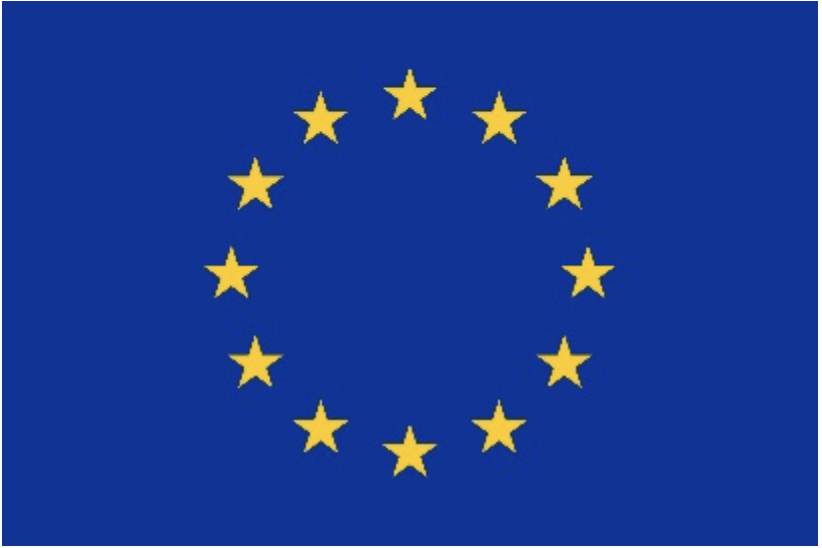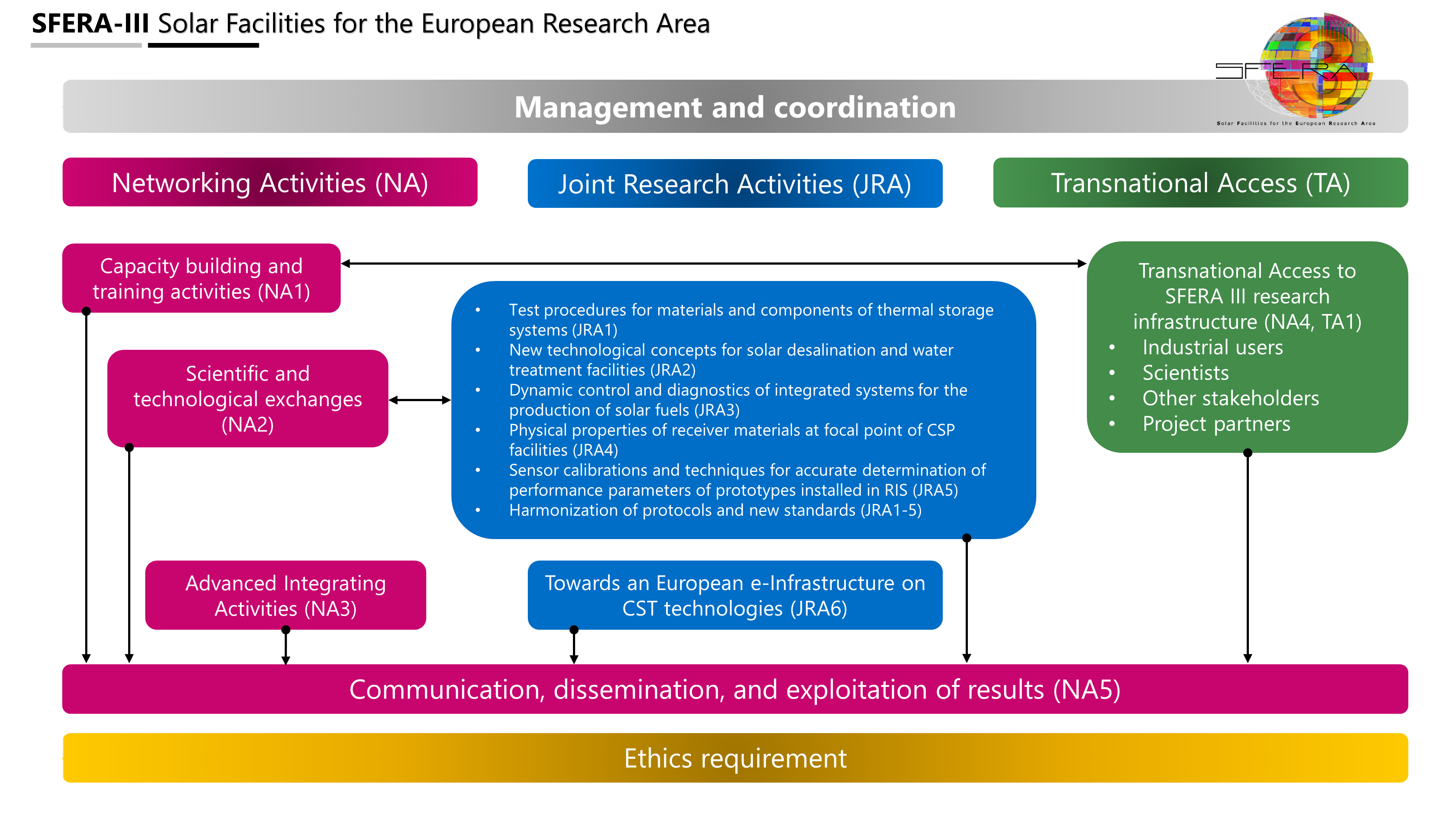About us
Objectives
The SFERA-III project addresses advanced science challenges and integrated research activities in the field of Concentrating Solar Thermal (CST) by integrating key European research infrastructures into an ambitious wide project aiming at offering to the R&D community a new level of high-quality services.
In this context, the main European research institution operating a unique set of Research Infrastructures (RIs) in CST are coordinating efforts to promote innovative researches, to improve services offered by concentrating solar RIs and to train researchers and engineers on the CST technologies. Both academia and industry users are targeted. These RIs will be open to all European researchers as part of the transnational access activities, from both academia and industry, and attention will be paid to ensure their optimal use and joint development avoiding duplication of the services offered.
A series of networking activities has been set up to reinforce and extend the partnership of the RIs participating in the proposal, including outreach and educational activities for new European researchers; activities to accelerate the transfer of knowledge between the participants, e.g. organisation of doctoral colloquia and the winter/summer schools, workshops and exchange of scientific personnel, ...
In addition, the joint research activities (JRAs) are planned to increase the research capacities and services of the RIs and to improve the existing ones, in such a way that the researches can be extended in number and in quality. This improved infrastructures and services will surely attract an increased number of new users, thus contributing to the overall goals of this SFERA-III project
Work Packages
The structure of the work plan is divided into thirteen work packages (WPs) under three different categories of activities :
- Networking activities (WP1, WP2, WP3, WP4 and WP12)
- Trans-national access activities (WP5 - comprising the access to 15 RIs)
- Joint research activities (WP6, WP7, WP8, WP9, WP10 and WP11).
Capacity building and
training activities
Scientific and
Technological Exchangese
Advanced
Integrating Activities
Organisation and
Management of the TA
Trans-national
Access Activities
Development of test procedures for materials and components of thermal storage systems
Development and testing of new technological concepts for solar desalination and water treatment facilities
Dynamic control and
diagnostics of integrated
systems for the production
of solar fuels
Monitoring physical properties
of receiver materials at
focal point of concentrated
solar facilities
Sensor calibrations and techniques for accurate determination of performance parameters of prototypes installed in RI
Towards an European
e-Infrastructure on
CST technologies
Communication,
dissemination, and
exploitation of results
Management and Coordination
Partners

COUNTRY : ES
TYPE : RES
SKILLS / MAIN ROLE UN THE PROJECTS :
CIEMAT's participation in SFERA-III will be performed by the staff of Plataforma Solar the Almería (PSA), the largest public R&D centre in the World devoted to concentrating solar thermal systems. CIEMAT will offer trans-national access to the first-class experimental facilities at PSA related to solar water treatment, water desalination and concentrating solar systems with high solar flux. CIEMAT will also participate in the NAs and JRAs. In the NAs CIEMAT will participate in the workshops planned to check and verify measurement equipment and test protocols in the field of solar treatment of water, water desalination and qualification of components for solar concentrators. CIEMAT will also participate in the continuous monitoring of RI needs for CST in Europe. In the JRAs CIEMAT will participate in the activities aimed at improving current test devices and facilities to offer a better service.
COUNTRY : FR
TYPE : RES
SKILLS / MAIN ROLE UN THE PROJECTS :
CNRS has been exploring research and industrial usages of concentrated solar energy for 70 years using world unique facilities, especially high concentration solar furnaces. CNRS is a founding member of the EU-SOLARIS ESFRI project under construction, and has been deeply involved in numerous European projects on CST for decades, particularly in previous infrastructure and coordination projects such as SOLFACE, SFERA, SFERA-II and STAGE-STE. In this project, CNRS-PROMES will provide about 80 weeks of Access to most of its solar facilities (high concentration solar furnaces, parabolic trough and solar tower plants) for 100 to 120 external users. CNRS is involved in almost all WPs and leads WP1 (NA1: Capacity building and training activities) as well as WP9 (JRA4: Monitoring physical properties of receiver materials at focal point of concentrated solar facilities).
Discover some pictures of the CNRS-PROMES CSP facilities.
COUNTRY : IT
TYPE : RES
SKILLS / MAIN ROLE UN THE PROJECTS :
ENEA carry out activities in the CST sector since 2000 involving a team of 70 researchers and technicians and a park of specific experimental infrastructures (plants and laboratories) located at the Casaccia research centre. By using parabolic trough collectors, ENEA has developed an innovative technology chain based on a molten salt mixture functioning as heat transfer fluid and thermal storage. ENEA has been deeply involved in numerous European projects on CST for decades, particularly in previous infrastructure and coordination projects such as SFERA, SFERA-II and STAGE-STE. ENEA will offer access to the Casaccia CSP facilities; and will participate in WPs 1, 2, 3 and 4. SFERA-III ENEA’s main contributions are: (1) development of a dynamic control and diagnostics of integrated systems for the production of solar fuels; (2) definition of the need to develop an European e-Infrastructure on CST technologies; (3) contribution at the definition of the methodologies for Sensor calibrations and techniques for accurate determination of performance parameters of prototypes installed in RI.
COUNTRY : DE
TYPE : RES
SKILLS / MAIN ROLE UN THE PROJECTS :
DLR as part of the Sollab Alliance is one of the major laboratories for research and technology on solar concentrating systems. Aside basic research, DLR research is focused on industrial relevant topics. In SFERA-III, the main contributions are: (1) Provide users access to Synlight sun simulator; (2) Training for industries, Sollab doctoral colloquium and summer school, standardization and benchmarking; (3) Qualification and determination of optical, thermal and mechanical performance parameters of prototypes and components mounted in research infrastructure; (4) -Infrared measurements in operating experiments under challenging conditions (varying emittance, large surfaces); and (5) Participate in EU-Solaris and e-Infrastructure.
COUNTRY : FR
TYPE : RES
SKILLS / MAIN ROLE UN THE PROJECTS :
CEA through its institute LITEN is one of Europe's leading research centres in the new energy technology field. Within SFERA-III CEA’s main contributions are: (1) Provide users access to ESTHER and DURASOL infrastructure, (2) Leading WP 2 and tasks 2.1, 2.2, 3.1, 6.3, 7.4, (3) Continuous monitoring of research infrastructure needs for CST in Europe, (4) Training for industries and short-term training on ageing and characterisation of materials for CST, (5) Definition of common standards, protocols and interoperability, (6) Development of protocols to test prototypes for storage systems, (7) Improvement of capabilities, performance and quality of software dedicated to desalination design, (8) Dynamic control and automation of solar fuel reactors, (9) Improvement of the in-situ assessment of the mechanical health of solar receivers, (10) Improvement of the infrared temperature measurements thanks to better assessment of the emittance and its evolution.
COUNTRY : PT
TYPE : UNI
SKILLS / MAIN ROLE UN THE PROJECTS :
UEVORA and its organic group Renewable Energies Chair is one of the major research centers in Portugal in solar energy related topics. Within SFERA-III UEVORA’s contributions are: (1) Definition of common standards, protocols and interoperability; (2) Characterization and feasibility of materials for storage media and TES systems; (3) Innovative components for solar driven wastewater treatment plants based on CPC collectors; (4) Provide access to the EMSP (Evora Molten Salt Platform) and PECS (Solar Collectors Testing Bench) facilities for accurate determination of performance parameters of prototypes; and (5) Participation in the communication/dissemination, promotion and e-Infrastructure of the project.
COUNTRY : CH
TYPE : UNI
SKILLS / MAIN ROLE UN THE PROJECTS :
R&D in the thermal and chemical engineering sciences with focus on high-temperature heat/mass transfer phenomena and multi-phase reacting flows, with applications in solar power, fuels, and materials production. ETHZ leads JRA3 - Dynamic control and diagnostics of integrated systems for the production of solar fuels. PREC has pioneered the development of solar thermochemical reactor technologies for producing clean transportation fuels using concentrated solar energy, and operates state-of-the-art laboratories for conducting research and development of solar thermochemical technologies, and that is why PREC is an ideal choice to co-ordinate this research topic.
COUNTRY : ES
TYPE : RES
SKILLS / MAIN ROLE UN THE PROJECTS :
It provides its expertise on very-high solar concentration systems and technologies mainly focused on sustainable production of energy carriers and raw materials using high-concentrations solar energy. Technical skills of interest in this project involve high-temperature processes engineering; optical design and characterisation of solar concentrators; material testing at high-temperature/high UV/Vis/IR radiation fluxes; and process simulation from systems analysis (flow sheeting) to computational fluid dynamics Participation in networking activities NA1 (WP1), NA2 (WP2), NA3 (WP3), NA4 (WP4), NA5 (WP12), trans-national activity TA1 (WP5) and joint research activities JRA3 (WP8) and JRA5 (WP10). Leader of subtask 8.1.
COUNTRY : CY
TYPE : RES
SKILLS / MAIN ROLE UN THE PROJECTS :
The Cyprus Institute is located in the Eastern Mediterranean, and is the only institution with advanced operating STE infrastructures in the region. Within SFERA-III CYI provides access to the Fresnel, PROTEAS, and Heliostat Testing facilities, and contributes to organization of user meetings, educational activities and trainings, leads the joint research activity on Desalination and Water Treatment, and participate in round robin tests and workshops relating to joint research actions on thermal storage and sensor performance.
COUNTRY : DE
TYPE : RES
SKILLS / MAIN ROLE UN THE PROJECTS :
The high temperature solar thermal and industrial process department is concerned with optics and surface technology to better transmit, reflect, absorb, redirect or concentrate solar radiation, as well as with solar thermal storage development and water treatment. Components and systems technology for CST plants are developed further in all aspects. Within SFERA-III FRA contributions are: (1) Advancement of sensor calibration and performance assessment procedures for line focusing collectors, soiling measurements and reflector panel shape measurements at research infrastructures; (3) Development and testing of membrane concepts for solar desalination and water treatment in CST plants; (3) Standardization of molten salt storage testing procedures. It is involved in the activities in WP1, WP2 and WP3 and also provides access to some of its key solar RIs.
COUNTRY : PT
TYPE : RES
SKILLS / MAIN ROLE UN THE PROJECTS :
LNEG gathers experience of more than 30 years in the field of Solar energy. It has testing facilities transversal to many research areas within the field of renewable energy which have proven to be relevant in the field of CST. LNEG’s infrastructure available to the project in TA is composed by three main facilities: Materials and Solar Laboratories; Fuel Cells and Hydrogen; High-Performance Computing Cluster. It also participates in NAs (WP2, 3, 4 12, 13) and JRAs (WP6 and WP8).
COUNTRY : TR
TYPE : UNI
SKILLS / MAIN ROLE UN THE PROJECTS :
METU will contribute to the JRA Task 6.3 ‘Development of protocols to test prototypes for storage systems’, with its unique expertise in the coupling of Computational Fluid Mechanics and the Discrete Element Method (CFD+DEM) to model high temperature dense granular flows, and the application of this modelling to identify suitable particle-based storage materials and to develop novel heat exchangers for charging and discharging of high-temperature solid-particle thermal energy storage systems. It will also contribute to the NAs by developing Turkish CST markets and capacities, and synergistically integrating these into larger European CST networks; and by opening its solar simulator for TNA.
COUNTRY : ES
TYPE : UNI
SKILLS / MAIN ROLE UN THE PROJECTS :
The University of Almeria participates in this project through its Solar Energy Research Centre (CIESOL) which develops research lines on modelling and control of CST plants, evaluation and forecast of solar resource, solar photocatalytic water decontamination and disinfection, membrane distillation. CIESOL accumulates knowledge and expertise on solar processes at pilot and pre-industrial scale and environmental advanced analytical chemistry backed up by 25 years of research activity. CIESOL will allow TNA to its unique facilities and will be part of the NAs and JRAs (WP7), to share its expertise in predictive and hierarchical control of solar energy systems and solar wastewater treatments with special emphasis on the removal of contaminants of emerging concern.
COUNTRY : FR
TYPE : SME
SKILLS / MAIN ROLE UN THE PROJECTS :
Specialized in communication and exploitation activities for R&D projects (see WP12 description) and networking activities in general (organisation of events, management of exchange of personnel, networking with other CST projects through already ongoing H2020 other initiatives, exhibition organiser, communication manager, etc). EURO is leader of the WP12 on Dissemination and Exploitation activities and WP2 task 3 leader on the management of the mobility of the partners
COUNTRY : BE
TYPE : NP
SKILLS / MAIN ROLE UN THE PROJECTS :
ESTELA will continue to support and contribute to this project, acting as bridge between the ‘SFERA-III Research Infrastructures’ and the European Solar Industry, with an expected relevant contribution in the ‘Networking Activities’, therefore reinforcing the connection between the industry and research institutions.

This project has received funding from the European Union’s Horizon 2020 research and innovation programme under grant agreement No 823802

